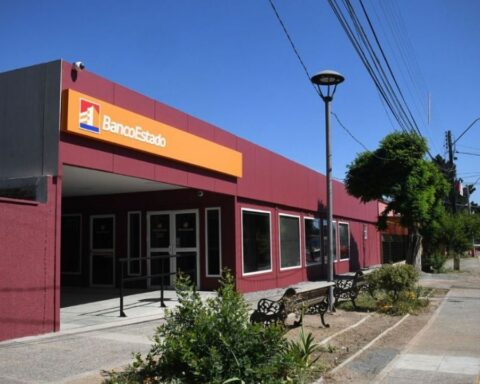After the meeting between Minister Giorgio Jackson (RD) and the former presidential delegate in La Araucanía, Raúl Allard, during the visit of the head of Social Development on September 23, Jackson was consulted about the results of the Good Living Plan. The initiative, whose fundamental goal is to revive the old Mapuche parliaments of the Old Homeland to advance agreements with the State and which had been presented in May by the former Minister of the Interior, Izkia Siches, recently passed – on the recommendation of the UN. from the portfolio of the Interior to that of the Segpres, as a formula to strengthen dialogue.
Although, at the time, Minister Jackson reported that the plan had made substantial progress, especially in recovering ties and trust with the Mapuche communities, the truth is that regional and local authorities in the southern zone -associated with political parties Government – affirm the opposite. They accuse excessive centralism in the efforts of the person in charge of the plan, the psychologist of Social Convergence, Víctor Ramos, about whom it is assured in La Moneda that the President has “a special mandate.” In particular, the local chiefs complain that the work they have done on the ground with the local authorities of the Mapuche people is not being taken into account. Something that is substantial when it comes to identifying who are the valid interlocutors to establish parliaments similar to those carried out by indigenous leaders and the Spanish Crown in the 18th century.
political management
“There has been a kind of lack of respect if there is a central authority in charge of this program that has never communicated with the regional governor,” assured Luis Cuvertino Gómez (PS), regional governor of Los Ríos, in the middle of the start of the visits to municipalities by the Good Living team. “I think it is important to discuss with the governors of these regions where the plan is pointing and what the spirit is. In our case we have previous work, articulation, and political relations with the communities”.
Although Cuvertino rushes to affirm that he generally has a good opinion of the objectives of the government initiative, he emphasizes that the focus must be on “the particularities of each territory.”
“This is especially important regarding the relationship with the Mapuche authorities, where there are no general authorities, but, by area, therefore, it is very diverse. The construction of this plan should aim to solve the problem we have today, which it is in the line of political management. The first thing is to recognize the dialogue, that dialogue must generate dialogues of trust”.
Officials from the Government of Los Ríos describe, for their part, they have held meetings with representatives of the presidential delegation to make a map of names of indigenous authorities, in order to “know who is who in each territory and the levels of commitment, the objective of trust, in some they are land claims, others have demands for services from the State such as land connectivity, connectivity, and health”. That uprising, they say, “is advanced and work is being done.”
For the success of the Plan, they explain that it is essential that those who direct the initiative be able to make use of this knowledge. “In the regional government we have a certain legitimacy with the authorities of some territories” and that encompass “more than a hundred communities and each territory has different demands.”
Recently, they anticipate that the conversations between the local authorities and those responsible for the government plan have begun to take place gradually. Until now, they have held three meetings with government representatives in the region where they have analyzed the contents and depth of what the Good Living program is, however, they point out that they are unaware of “the specific activities of the initiative.”
materialization of the plan
Luciano Rivas (Evópoli), regional governor of La Araucanía told the The Counter at La Clave that results of the program that “unfortunately we have not seen, and unlike other years, where the plans were seen to be being executed, the Good Living Plan. I would say that at the regional level they have not seen this plan in action.”
“The Good Living Plan has to be much more comprehensive. I do not agree that we have a plan where the municipalities are not being approached directly to ask what the requirements are, where they do not approach the Regional Government to see what is going to be the line of action in which we can work together”, he added.
Along these lines, he stated that his vision and analysis of “what has happened so far is not positive. I believe that we have not seen in action this Good Living Plan that was announced with great fanfare in March and the truth is that, at least from the point of view of what one can perceive from the Regional Government, it has not been like that ” .
According to the mayor of Temuco, Roberto Neira (PPD), “at the moment there has been no materialization of the Plan in these months. I think there is a delay in the delivery of information.” To this is added that he is not clear about the ” focus on the issues that the Good Living Plan claims to have.” The mayor explained that he has talked with Víctor Ramos, but “I have never had a conversation with the regional manager.”
Even so, he valued the objectives of the government initiative: “The Good Living Plan has many positive elements that, if addressed, would allow us to have an approach to what we intend as a region to get out of some social, economic, and connectivity problems.”
Neira described that he had the opportunity to comment on his objections to the President in a meeting via Zoom that he attended as vice president of the Chilean Association of Municipalities. “We told him that a strengthening of the Good Living Plan was needed, and secondly, the materialization of the issue.” “He took notes on this, he said that it seemed strange to him that it was happening,” he commented.
“I hope that the announced measures are worked on responsibly, and in conjunction with all the actors, where local governments must collaborate intensely. For the measures of this plan to materialize, the government must dedicate time and talk with all the actors in the territory”, assured the mayor of Reinaco, Juan Carlos Reinao (Ind).
“My opinion would be favorable if there is a Good Living program that has a stable presence, budget coherence, and recognizable lines of action,” said an official official.
“Any program that is installed in the region that does it with us, we have knowledge of the territory and progress in the dialogue, any program that is born with a centrist perspective has many components of risk. It is a voluntary program with little certainty of what is must do in the territory,” he added.
Government visits
As a counterpart to the criticism of the local authorities, Palacio sources assure that the national team of the Good Living Plan has concentrated its efforts during the last weeks in opening dialogue in the districts of Malleco. They say that so far they have personally visited the mayors of Curacautín, Ercilla and Traiguén.
They recognize that there is some concern that the State strategy that is being developed has legitimacy not only from the political world, but also from the Mapuche communities, and from parceleros. For this reason, they explain, the way of approaching the dialogues started from identifying that there is a historical conflict that has to do with different factors such as territorial devolution and aspects of racism. Inside La Moneda they describe that “this conflict will not disappear if it is not addressed. We are trying to build the bridges to create a state policy that encompasses the complexity of the situation.”
Under this logic, he maintains that the first months of the program focused on opening bridges with Mapuche communities, as a channel to channel their demands. The idea, in summary, is to bring to the dialogue important elements for the Mapuche communities, such as the habitability of the land, which is nothing more than finding ways so that the lands of the communities can be productive. They describe that the dialogues with Mapuche communities and parceleros have given “a pulse of the needs”, but that now “specificities” are being collected, to avoid the loss of nuances.
Even so, they recognize that due to contingency issues, the national Good Living team has had to show the progress of the initiative to the ministers as a result of the states of exception, so that they can be socialized in Congress. What they indicate is that it has generated deriving work time to “be accountable” to the ministries, but they assure that now the team is focused on local authorities.
ANDVíctor Ramos’ team begins meetings with local authorities
At 7:00 p.m. on September 30 – the same day that Interior Minister Carolina Tohá arrived in La Araucanía to meet with authorities the following day – Víctor Ramos arrived at the municipality of Ercilla to meet with Mayor Valentín Vidal (independent elected through the list made up of the DC, the PRO and Ciudadanos). He was with members of the national team of Good Living, that is, La Moneda, Francisco Arellano and Francisca Magnani. In addition to the regional manager of the program, José Millalén.
According to sources inside the municipality, the mayor received them at 7:00 p.m. and they worked until 10:00 p.m. At the meeting, the mayor gave them guidance on the number of indigenous communities, how they work with them and what the needs they have identified would be. They touched on topics such as the need for roads, bridges, and connectivity such as antennas to access the Internet. The budget of the Communal Development Plan (PLADECO) was also presented, which would have been delivered –through Ramos– to the corresponding portfolio, and according to reports from the municipality, days later it was signed.
In addition, it is assured within the administration, that the mayor agreed to send them guidelines of the context in the commune of Ercilla and the priorities. “When he arrived at the commune he already had a diagnosis because his people had been working in the rural sectors. They came with a folder. We give you information about the municipality. So the idea was that these data be taken to Santiago and collated, ”Ercilla’s head, Valentín Vidal, described the appointment.
Víctor Ramos, for his part, assures that “we have listened to the mayors at different times. We have attended different presentations that they have made with the ministers who lead the Good Living Plan, we did it with the minister Jeanette Vega –former head of Social Development–we have listened to your points of view, Minister Izkia Siches –former interior holder– He received them in La Moneda, with Minister Giorgio Jackson recently as well. We have had different instances in which we have been able to work with the mayors of Biobío, La Araucanía, where we have been collecting the difficulties they have.
Regarding the times, Ramos affirms that he has enough time. “This plan takes just five months and the conflict is a century old, therefore, there is still time to work together. The deadlines are going to depend a lot on the political conversations that we are having. If it is going to become a State program It needs a consensus, which is what we are producing now. What the program is going to be about, what direction it is going to cover. Those deadlines are going to be defined. I would hope that we could begin to work very strongly within the framework legal proposal proposed by the ministers next year”.








